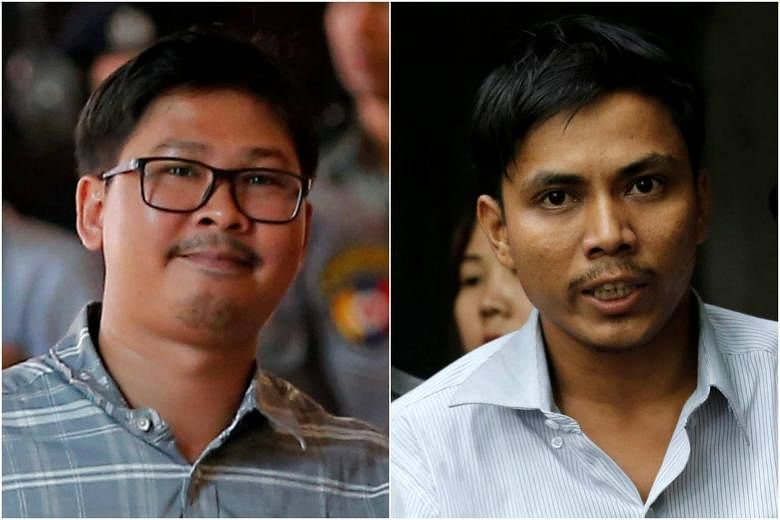YANGON (AFP, REUTERS) - Two Reuters reporters accused of breaching a draconian secrecy law in Myanmar will find out next week whether they will face a full trial, after lawyers delivered closing statements on Monday (July 2).
Wa Lone, 32, and Kyaw Soe Oo, 28, are accused of breaching the Official Secrets Act - which carries up to 14 years in jail - during their reporting of a military crackdown on the Rohingya minority.
The pair have been held in custody for more than six months in a protracted case that has been pilloried by rights groups and foreign observers as an assault on media freedom.
The Myanmar nationals were arrested in December 2017 and accused of possession of sensitive material linked to security operations in crisis-hit Rakhine state.
"Next week on July 9 the court will decide whether to charge or not," Judge Ye Lwin told the Yangon court after hearing the closing arguments.
Lawyers for the reporters say they were entrapped by police - a version of events endorsed in court by a whistleblowing cop who testified that officers were ordered to set up the reporters.
The pair had been investigating a massacre of 10 Rohingya Muslims at Inn Din village in Rakhine state during last year's military-led crackdown on Rohingya militants.
Army operations forced more than 700,000 of the minority, who are denied citizenship in Myanmar, to flee to Bangladesh.
The military has admitted security forces were involved in a massacre at the site, but vehemently denies allegations it launched a wider campaign of atrocities, including rape and murder.
The UN and the US says the crackdown on the Rohingya was tantamount to ethnic cleansing.
A handcuffed Wa Lone expressed hope for a "fair" ruling next week.
"We reported Rakhine news and we needed to contact the police officers to get information... we are not traitors," he said as he left the court.
In April, defence lawyers Khin Maung Zaw and Than Zaw Aung filed a petition asking Judge Ye Lwin to dismiss the case, arguing there was insufficient evidence to support charges of obtaining secret government papers.
The judge rejected the motion.
Throughout, the defence has said the prosecution has failed to establish how the alleged documents had come into the reporters' possession.
"In the law, in the Official Secrets Act, it is said that these documents, those official secret documents, must be obtained," Khin Maung Zaw said in a June 18 hearing.
"They cannot prove that they were obtained."
The defence has also said prosecution failed to show how the reporters posed a threat to national security or name the"enemy" they were allegedly aiming to support.
In addition, they have argued that the information included in the documents had already been made public and therefore was not secret.
During previous hearings, one of the police witnesses told the court he had burned his notes made at the time of the arrests.
A civilian witness had the location where police say the arrests was made - which emerged as a key point of contention during the proceedings - written on his hand.
Lead prosecutor Kyaw Min Aung, arguing in April against the dismissal of the case, said the documents the reporters had in their possession were secret and that the court could assume they intended to harm the security of the country.
In his ruling at the time, Judge Ye Lwin said there was "a proper reason" for the accusations against the two reporters and therefore "they should not be released."
Myanmar government spokesman Zaw Htay has declined to comment throughout the proceedings, saying Myanmar courts were independent and the case will be conducted according to the law.
DECEMBER ARRESTS
At the time of their arrest in December, the reporters had been working on an investigation into the killing of 10 Rohingya Muslim men and boys in a village in western Myanmar's Rakhine State.
The killings took place during a military crackdown that U.N. agencies say sent more than 700,000 people fleeing to Bangladesh.
The reporters have told relatives they were arrested almost immediately after being handed some rolled up papers at a restaurant in northern Yangon by two policemen they had not met before.
In April, Police Captain Moe Yan Naing testified that a senior officer had ordered his subordinates to plant secret documents on Wa Lone to "trap" the reporter.
After his court appearance, Moe Yan Naing was sentenced to a year in jail for violating police discipline and his family was evicted from police housing.
Police have said the eviction and his sentencing were not related to his testimony.
Senior police officials have dismissed the testimony as untruthful.
Writers, press freedom and human rights activists around the world have rallied on behalf of the imprisoned reporters, with the United Nations and several Western countries calling for their release.

